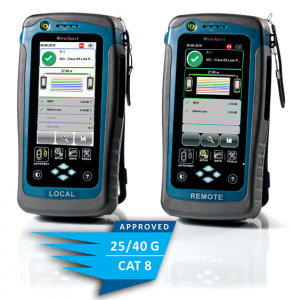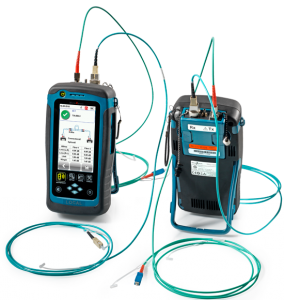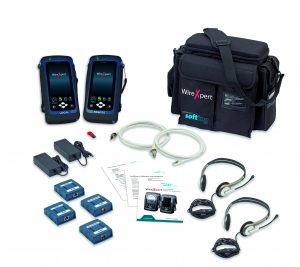What Is Network Certification?
Network certification, particularly fiber-system certification, is one of those activities that has grown to depend almost entirely on the capabilities of the tools used to accomplish the task. But managing this end of the business means trying to hit a moving target. Bandwidth grows, loss budgets shrink, standards are rewritten to accommodate ever-higher speeds, all of which drive improvements in cable testing technology. It’s not likely to get simpler anytime soon. If you haven’t drilled down too deeply into the testing-device landscape lately, here are four things to look for in a cable certifier.
Modularity:
It pays to be nimble. Like almost any kind of smart device these days, the core technology and firmware built into cable certifiers are intrinsically expensive. In exchange you get (mostly) amazing math, graphics, storage, data analysis, reporting and communication. How do you maximize the value of your investment in devices and still have what you need to handle your next call? One way is to look at modularity.
Most certifiers are capable of testing more than one type of cable. But that doesn’t mean they make it easy. Look for one that lets you choose from a range of interchangeable adapters, connectors and reference cords. This helps distribute some of the device cost across less-expensive components.
WireXpert by Softing, for example, exploits this principle using an extremely smart universal base unit with adapters for singlemode, multimode fiber, MPO/MTP for fiber, or copper that slip in and out of the unit. The multimode adapter is also compliant with the newer encircled flux (EF) standard and comes with a set of modally transparent test reference cords that ensure EF launch conditions.
Cost to operate:
Modularity is fine as long as it helps you manage operating costs. Deploying universal testers lets you reduce the number of more-expensive single-purpose testers in your fleet. But there are at least two other factors to consider.
Not all certifiers are created equal when it comes to the capabilities of remote and local units. In fact, a smart/dumb pairing is fairly typical. This is less of an issue if you typically work with a partner.
Otherwise, be prepared to keep walking back and forth to the local unit to troubleshoot and analyze test results. Our remote and local units are virtually identical, making one-person jobs much quicker and easier. Regardless of how things go onsite, interchangeability like this will always help technicians find ways to save time.
EF, Category 8, IoT:
A few years ago the EF standard (IEC 61280-4-1) was implemented as a method of setting reference in multimode fiber certification that corrected for intrinsic variability in launch conditions. EF is more important than ever because consultants, engineers and manufacturers are specifying loss budgets that are tighter than conventional standards. The industry has moved on. If your fiber certifiers aren’t EF-compliant, you are already missing an important tool for being able to meet specs and win business.
The need to be able to test frequencies above 2,000 MHz has arrived. The Category 8 standard recently was finalized, and 40-Gbit in the data center is a reality. Most testers in the field top out around 1,200 MHz, so contractors are looking to upgrade at least some of their units when newer versions come out. If you need one now, the exception is the WireXpert 4500, which was the first Category 8 tester available and has a test range of up to 2,500 MHz.
High-speed enterprise networks, industrial automation and the Internet of Things are generating and consuming more data than ever. As additional platforms and protocols come online, network architecture grows more diverse. RJ45 connections, for example, are universal for copper, but certain industrial applications use M12. Fiber connector types include FC, SC, LC, ST and MPO. With all the variety out there, you’ll want a tester that can be upgraded over time with adapter options for patch cord testing, VNA, M12 and MPO.
Distributor support needed:
With all that’s riding on network certification, contractors just can’t afford to be caught short with outdated, substandard, or failing equipment. And none of it is cheap. You can buy popular cable certifiers for a pretty good price at the same online store you get your music. But what will the price be next month or next year? And what about accessories? Buying direct is a great way to manage costs for some things. Maybe not for cable certification equipment and supplies. You can’t expect to get anywhere near the same level of service and support you would when you buy through distributors.
Repair, calibration, loaners, accessories-all of these additional necessary expenses can be managed far more effectively through manufacturer and distributor service and support packages.
In a nutshell: Stay nimble by looking for modular certifiers that let you maximize your equipment deployment. Look to manage operating costs with certifiers that make the task more efficient and convenient. Maintain headroom with future-friendly equipment; it’s hard enough to keep up, and it’s even harder to catch up. And don’t ignore the value of service and support. Distributors are much more interested in your success than the online music store.





